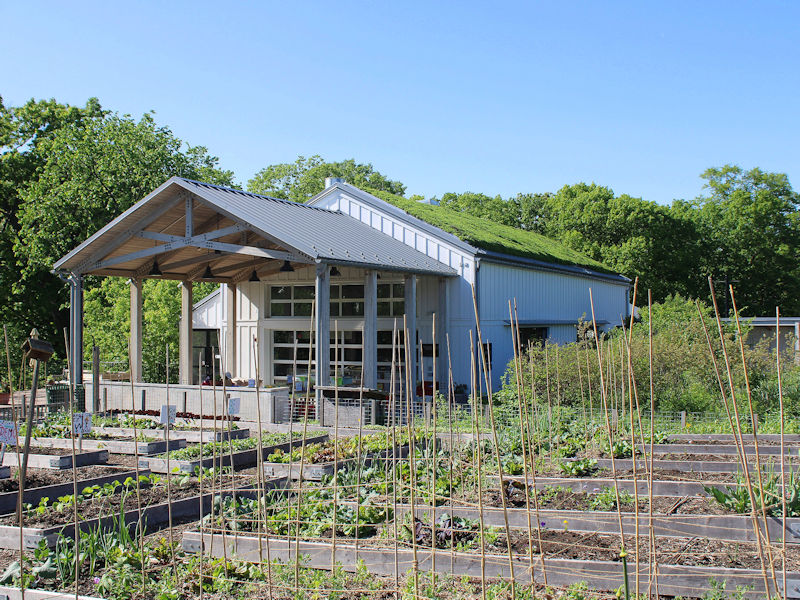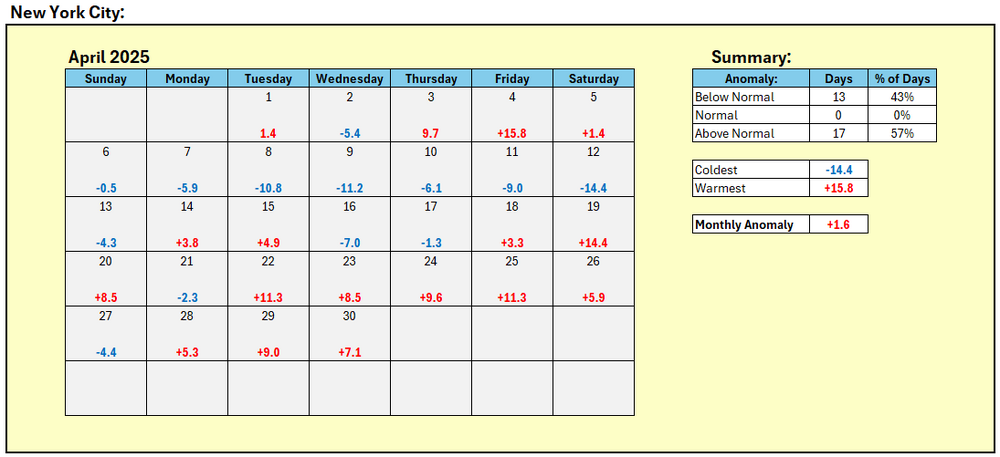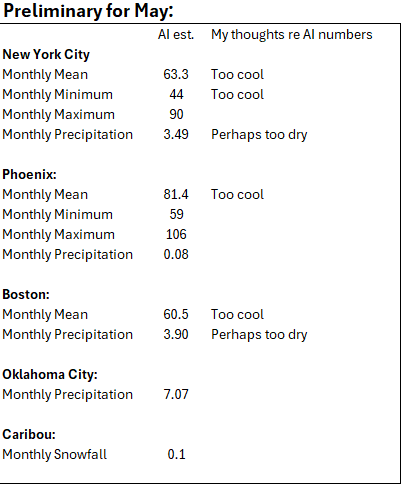-
Posts
22,901 -
Joined
Content Type
Profiles
Blogs
Forums
American Weather
Media Demo
Store
Gallery
Everything posted by donsutherland1
-
It will become mostly cloudy but still dry between 6 am and 8 am. With perhaps a light shower, it should be mainly or completely dry into the evening. Clouds could break for a time on Friday. More sustained clearing should commence Saturday afternoon. At least, that's where things currently stand.
-
Tomorrow will be dry and continued pleasant. Temperatures will generally top out in the lower 70s. Showers and/or thundershowers are possible Tuesday night into Wednesday. It will turn somewhat warmer on Thursday and the week could end with temperatures in the upper 70s to perhaps 80°. Meanwhile, parts of Texas will see extreme heat. The temperature could approach or set new May monthly high temperature records in such cities as Austin, Del Rio and San Antonio on Wednesday. The extended guidance has grown cooler for the second half of May than it had been. Both the CFSv2 and ECMWF weekly guidance are now in good agreement that the second half of the month could average near normal overall. The ENSO Region 1+2 anomaly was +0.1°C and the Region 3.4 anomaly was -0.1°C for the week centered around April 30. For the past six weeks, the ENSO Region 1+2 anomaly has averaged +0.68°C and the ENSO Region 3.4 anomaly has averaged -0.05°C. Neutral ENSO conditions will likely continue through at least early summer. Early indications are that summer 2025 will be warmer than normal in the New York City and Philadelphia areas. The potential exists for a much warmer than normal summer (more than 1° above normal). The SOI was -0.82 today. The preliminary Arctic Oscillation (AO) was +0.718 today. Based on sensitivity analysis applied to the latest guidance, there is an implied near 76% probability that New York City will have a warmer than normal May (1991-2020 normal). May will likely finish with a mean temperature near 65.6° (2.4° above normal).
-
Under bright sunshine, the mercury rose into the middle and upper 70s across the New York City area. Newark topped out at 81°. Tomorrow through much of Tuesday will be dry and pleasant days. Temperatures will generally top out in the lower 70s. Showers and/or thundershowers are possible Tuesday night into Wednesday. It will turn somewhat warmer on Thursday and the week could end with temperatures in the upper 70s to perhaps 80°. Meanwhile, parts of Texas will see extreme heat. The temperature could approach or set new May monthly high temperature records in such cities as Austin, Del Rio and San Antonio. The extended guidance has grown cooler for the second half of May than it had been. Both the CFSv2 and ECMWF weekly guidance are now in good agreement that the second half of the month could average near normal overall. The ENSO Region 1+2 anomaly was +0.1°C and the Region 3.4 anomaly was -0.1°C for the week centered around April 30. For the past six weeks, the ENSO Region 1+2 anomaly has averaged +0.68°C and the ENSO Region 3.4 anomaly has averaged -0.05°C. Neutral ENSO conditions will likely continue through at least early summer. Early indications are that summer 2025 will be warmer than normal in the New York City and Philadelphia areas. The potential exists for a much warmer than normal summer (more than 1° above normal). The SOI was -11.85 today. The preliminary Arctic Oscillation (AO) was +1.173 today. Based on sensitivity analysis applied to the latest guidance, there is an implied near 76% probability that New York City will have a warmer than normal May (1991-2020 normal). May will likely finish with a mean temperature near 65.7° (2.5° above normal).
-
Tomorrow through much of Tuesday will be dry and pleasant days. Tempertures will generally top out in the lower 70s. Some showers are possible Tuesday night into Wednesday. The extended guidance has grown cooler for the second half of May than it had been. Both the CFSv2 and ECMWF weekly guidance are now in good agreement that the second half of the month could average near normal overall. The ENSO Region 1+2 anomaly was +0.1°C and the Region 3.4 anomaly was -0.1°C for the week centered around April 30. For the past six weeks, the ENSO Region 1+2 anomaly has averaged +0.68°C and the ENSO Region 3.4 anomaly has averaged -0.05°C. Neutral ENSO conditions will likely continue through at least early summer. Early indications are that summer 2025 will be warmer than normal in the New York City and Philadelphia areas. The potential exists for a much warmer than normal summer (more than 1° above normal). The SOI was -16.68 today. The preliminary Arctic Oscillation (AO) was +1.220 today. Based on sensitivity analysis applied to the latest guidance, there is an implied near 78% probability that New York City will have a warmer than normal May (1991-2020 normal). May will likely finish with a mean temperature near 65.8° (2.6° above normal). That would tie 2025 with 1975 as the 10th warmest May on record.
-
After a morning low of 50°, NYC topped out at a sunny 71°. Even as the rain washed down a lot of the blossoms at the New York Botanical Garden, there were still some picturesque scenes.
-
Showers and periods of rain are likely through at least the first half of tonight. A general storm total 0.50"-1.50" rainfall is likely with some locally higher amounts by the time all of the rain winds down. Following the weekend, it will turn warmer and possibly drier. Some showers will be possible Tuesday night into Wednesday. The ENSO Region 1+2 anomaly was +0.1°C and the Region 3.4 anomaly was -0.1°C for the week centered around April 30. For the past six weeks, the ENSO Region 1+2 anomaly has averaged +0.68°C and the ENSO Region 3.4 anomaly has averaged -0.05°C. Neutral ENSO conditions will likely continue through at least early summer. Early indications are that summer 2025 will be warmer than normal in the New York City and Philadelphia areas. The potential exists for a much warmer than normal summer (more than 1° above normal). The SOI was -13.16 today. The preliminary Arctic Oscillation (AO) was +1.412 today. Based on sensitivity analysis applied to the latest guidance, there is an implied near 78% probability that New York City will have a warmer than normal May (1991-2020 normal). May will likely finish with a mean temperature near 66.0° (2.8° above normal). That would tie 2025 with 1986 as the 9th warmest May on record.
-
Another system will affect the region tomorrow into Saturday before drier air returns. Showers and perhaps some heavy thunderstorms are possible. A general 0.50"-1.50" rainfall is likely with some locally higher amounts. Some of those areas with locally higher amounts could pick up in excess of 3" of rain. Following the weekend, it will turn warmer and possibly drier. Some showers will be possible Tuesday night into Wednesday. The ENSO Region 1+2 anomaly was +0.1°C and the Region 3.4 anomaly was -0.1°C for the week centered around April 30. For the past six weeks, the ENSO Region 1+2 anomaly has averaged +0.68°C and the ENSO Region 3.4 anomaly has averaged -0.05°C. Neutral ENSO conditions will likely continue through at least early summer. Early indications are that summer 2025 will be warmer than normal in the New York City and Philadelphia areas. The potential exists for a much warmer than normal summer (more than 1° above normal). The SOI was +0.48 today. The preliminary Arctic Oscillation (AO) was +1.339 today. Based on sensitivity analysis applied to the latest guidance, there is an implied near 79% probability that New York City will have a warmer than normal May (1991-2020 normal). May will likely finish with a mean temperature near 66.2° (3.0° above normal). That would make 2025 the 9th warmest May on record.
-
Tomorrow will be partly sunny and warm. Temperatures will likely rise into the lower and middle 70s. Another system could affect the region Friday into Saturday before a cooler drier air mass arrives. Showers and perhaps some heavy thunderstorms are possible. A general 0.50"-1.50" rainfall is likely with some locally higher amounts. Following the weekend, it will turn warmer and possibly drier. The ENSO Region 1+2 anomaly was +0.1°C and the Region 3.4 anomaly was -0.1°C for the week centered around April 30. For the past six weeks, the ENSO Region 1+2 anomaly has averaged +0.68°C and the ENSO Region 3.4 anomaly has averaged -0.05°C. Neutral ENSO conditions will likely continue through at least early summer. Early indications are that summer 2025 will be warmer than normal in the New York City and Philadelphia areas. The potential exists for a much warmer than normal summer (more than 1° above normal). The SOI was +5.23 today. The preliminary Arctic Oscillation (AO) was +1.550 today. Based on sensitivity analysis applied to the latest guidance, there is an implied near 75% probability that New York City will have a warmer than normal May (1991-2020 normal). May will likely finish with a mean temperature near 66.0° (2.8° above normal). That would tie 1986 for the 9th warmest May on record.
-
Tomorrow and Thursday will be partly sunny and warmer. Temperatures will likely rise into the lower and middle 70s. Another system could affect the region Friday into Saturday before a cooler drier air mass arrives. Showers and perhaps some heavy thunderstorms are possible. Following the weekend, it will turn warmer and drier. The ENSO Region 1+2 anomaly was +0.1°C and the Region 3.4 anomaly was -0.1°C for the week centered around April 30. For the past six weeks, the ENSO Region 1+2 anomaly has averaged +0.68°C and the ENSO Region 3.4 anomaly has averaged -0.05°C. Neutral ENSO conditions will likely continue through at least early summer. Early indications are that summer 2025 will be warmer than normal in the New York City and Philadelphia areas. The potential exists for a much warmer than normal summer (more than 1° above normal). The SOI was -1.51 today. The preliminary Arctic Oscillation (AO) was +1.509 today.
-
Yes. Almost coast-to-coast warmth.
-
Additional rain is likely tomorrow and Wednesday. It now appears that the dry respite will be brief. Another storm could affect the region Friday into Saturday before a cooler drier air mass arrives. The ENSO Region 1+2 anomaly was +0.1°C and the Region 3.4 anomaly was -0.1°C for the week centered around April 30. For the past six weeks, the ENSO Region 1+2 anomaly has averaged +0.68°C and the ENSO Region 3.4 anomaly has averaged -0.05°C. Neutral ENSO conditions will likely continue through at least early summer. Early indications are that summer 2025 will be warmer than normal in the New York City and Philadelphia areas. The potential exists for a much warmer than normal summer (more than 1° above normal). The SOI was +1.47 today. The preliminary Arctic Oscillation (AO) was +0.778 today.
-
Tomorrow will be rainy and cool. Temperatures will likely top out in the lower and middle 60s. Additional rain is likely into Wednesday before a cooler and drier air mass moves into the region. The coolest air this month could arrive to end the week. It is possible that New York City could see a low temperature near or just below 50° on Friday or Saturday. The ENSO Region 1+2 anomaly was -0.3°C and the Region 3.4 anomaly was 0.0°C for the week centered around April 23. For the past six weeks, the ENSO Region 1+2 anomaly has averaged +0.82°C and the ENSO Region 3.4 anomaly has averaged -0.05°C. Neutral ENSO conditions will likely continue through at least early summer. Early indications are that summer 2025 will be warmer than normal in the New York City and Philadelphia areas. The potential exists for a much warmer than normal summer (more than 1° above normal). The SOI was -2.97 today. The preliminary Arctic Oscillation (AO) was +0.650 today.
-
Some of the locations with the tulips also have daffodil bulbs.
-
Today was another exceptionally warm day. Temperatures again rose into the 80s across much of the region. Behind the front, it will turn somewhat cooler tomorrow. A wet pattern is likely tomorrow through Wednesday. A significant rainfall is possible, but there remain large differences among the computer models. The European Model is most aggressive in showing 5" or more rainfall. An early estimate of a general 1"-3" total with locally higher amounts during the Sunday-Wednesday period looks reasonable. The ENSO Region 1+2 anomaly was -0.3°C and the Region 3.4 anomaly was 0.0°C for the week centered around April 23. For the past six weeks, the ENSO Region 1+2 anomaly has averaged +0.82°C and the ENSO Region 3.4 anomaly has averaged -0.05°C. Neutral ENSO conditions will likely continue through at least early summer. Early indications are that summer 2025 will be warmer than normal in the New York City and Philadelphia areas. The potential exists for a much warmer than normal summer (more than 1° above normal). The SOI was -6.88 today. The preliminary Arctic Oscillation (AO) was +0.650 today.
-
The temperature rose to 85° in New York City. At the New York Botanical Garden, tulips are in peak bloom.
-
Today might be #4.
-
Temperatures soared into the 80s across the region today. New York City's high temperature was 84°. Tomorrow will be another unseasonably warm day. Highs tomorrow will likely reach the lower 80s in New York City and mid 80s in the warmest spots. Afternoon or evening thunderstorms are possible as a cool front drifts across the region. Behind the front, it will turn somewhat cooler on Sunday. A wet pattern is likely Sunday through Wednesday. A significant rainfall is possible, but there remain large differences among the computer models. The European Model is most aggressive in showing 5" or more rainfall. An early estimate of a general 1"-3" total with locally higher amounts during the Sunday-Wednesday period looks reasonable. The ENSO Region 1+2 anomaly was -0.3°C and the Region 3.4 anomaly was 0.0°C for the week centered around April 23. For the past six weeks, the ENSO Region 1+2 anomaly has averaged +0.82°C and the ENSO Region 3.4 anomaly has averaged -0.05°C. Neutral ENSO conditions will likely continue through at least early summer. Early indications are that summer 2025 will be warmer than normal in the New York City and Philadelphia areas. The potential exists for a much warmer than normal summer (more than 1° above normal). The SOI was -4.65 today. The preliminary Arctic Oscillation (AO) was +0.977 today.
-
I agree. Once we get through the cooler period, I suspect some of the heat will move into the region.
-
There likely will be a period where it is dry on Sunday.
-
Tomorrow and Saturday will be unseasonably warm with tomorrow being the wwarmer of the two days. Highs tomorrow will likely reah the lower 80s in New York City and mid 80s in the warmest spots. It will turn somewhat cooler on Sunday. A wet pattern is likely Sunday through Wednesday. A significant rainfall is possible, but there remain large differences among the computer models. The ENSO Region 1+2 anomaly was -0.3°C and the Region 3.4 anomaly was 0.0°C for the week centered around April 23. For the past six weeks, the ENSO Region 1+2 anomaly has averaged +0.82°C and the ENSO Region 3.4 anomaly has averaged -0.05°C. Neutral ENSO conditions will likely continue through at least early summer. Early indications are that summer 2025 will be warmer than normal in the New York City and Philadelphia areas. The potential exists for a much warmer than normal summer (more than 1° above normal). The SOI was -4.19 today. The preliminary Arctic Oscillation (AO) was +1.598 today.
-
April AI vs. Actual Outcomes: AI showed a cool bias for the monthly mean temperatures. The extent of "skill" it has in monthly forecasts remains uncertain.
-
-
-
It will turn cooler tomorrow before warm air returns to the region ahead of an advancing cold front. The weekend will turn cooler again by Sunday. A wet pattern is likely Sunday through Wednesday. The ENSO Region 1+2 anomaly was -0.3°C and the Region 3.4 anomaly was 0.0°C for the week centered around April 23. For the past six weeks, the ENSO Region 1+2 anomaly has averaged +0.82°C and the ENSO Region 3.4 anomaly has averaged -0.05°C. Neutral ENSO conditions will likely continue through at least early summer. Early indications are that summer 2025 will be warmer than normal in the New York City and Philadelphia areas. The potential exists for a much warmer than normal summer (more than 1° above normal). The SOI was -6.71 today. The preliminary Arctic Oscillation (AO) was +1.619 today.
















